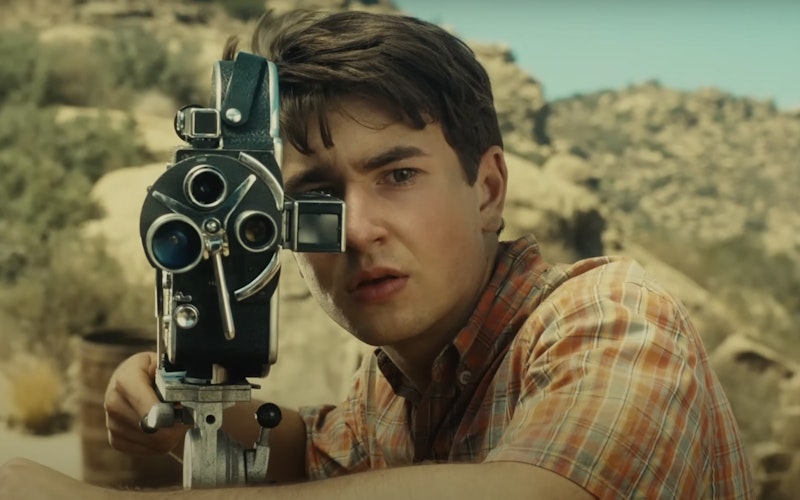
Movies
The Fabelmans and the Stewardship of Storytelling
If you could turn your life into a movie, who would you cast as yourself? Who would play your family members? Would you strive for objectivity in telling your most personal stories or tell the truth—but tell it slant?
These weren’t hypothetical questions for director Steven Spielberg as he crafted The Fabelmans, which follows Sammy Fabelman (a stand-in for Spielberg) as he cultivates a love for filmmaking amidst tense family dynamics while growing up in the 1950s and ’60s. Few get to enliven their past with cinematic flair in the way Spielberg does here. To be able to tell one’s story to an audience is a gift, which is something that Spielberg seems to recognize. The Fabelmans acts as a challenge to creatives to steward the power of storytelling well and to be mindful not only of what stories you tell, but how you tell them.
Stewardship grounds the film from the beginning. A young Sammy (Mateo Zoryan Francis-DeFord) receives an expensive train set for Hanukkah. Eager to recreate the train crash scene from 1952’s The Greatest Show on Earth, he’s a little too successful, causing a ruckus in his basement. When his parents come down to investigate, his exasperated dad, Burt (Paul Dano), tells him, “You can’t just love something. You also have to take care of it, right?”
Burt’s words take on new life years later when Sammy swaps his train set for a film camera. Now in high school (and played by Gabriel LaBelle), Sammy has found his place by becoming his class’ documentarian. At prom, when Sammy screens a film he made from their Ditch Day at the beach, Spielberg cleverly frames Sammy as one with power over the audience. As he mans the camera, the projected film clears a path and splits the watching audience down the middle. All eyes are on the story as Sammy keeps the film rolling, stringing them along. There’s particular focus given to one of his classmates: Logan (Sam Rechner), who had cruelly bullied Sammy throughout the year. Yet Sammy portrays Logan triumphantly, employing a mix of close-ups and slow motion to emphasize his chiseled frame. You’d be forgiven for thinking Sammy was shooting a cologne commercial.
After the screening, Logan confronts Sammy in the hallway. He can’t understand why Sammy would try to portray him positively, especially after the way he had been treated. (Logan’s incredulity brings to mind the Apostle Paul’s observation that doing good to your enemy is like“heap[ing] burning coals on his head.”) Logan is enraged that Sammy’s presentation of him ultimately makes him out to be someone he’s not. It sets a standard that he ultimately will never be able to reach. Confused, Sammy says, “I made you look like you could fly.” To which Logan responds, “But I can’t fly.” His parting words to Sammy are imbued with scorn: “Life’s nothing like the movies, Fabelman.”
To be able to tell one’s story is a gift, which is something that Spielberg seems to recognize.
In this scene , I sense Spielberg reminding himself that creatives have the power to shape the narratives of culture—and that is no small thing. In Sammy’s hands, Logan was powerless to change his classmates' perception of him or offer a different narrative; he was at the mercy of a story he didn’t have a say in crafting. While Sammy was caught up in the passion of his craft (“I did it to make my movie better” he gives as one reason why he portrayed Logan positively), he also had another responsibility. To recall Burt’s words, it isn’t enough just to love what you're doing; there was an element of stewardship that was missing.
Peter’s call in 1 Peter 4 to be good stewards of our respective gifts comes to mind here. Peter writes, “Each of you should use whatever gift you have received to serve others, as faithful stewards of God’s grace in its various forms.” Being “faithful stewards” means using our gifts in service of others–not using them for our own gain. What might that have looked like for Sammy? While his portrayal of Logan was not negative, it was glowing to the point of being sardonic. As tempting as it may be to demonize our enemies, perhaps being a faithful steward of Gods’ grace means prioritizing empathy, even for our adversaries. Rather than twist the truth to our own means, we ought to strive for a more authentic and nuanced form of truth-telling.
I’m reminded of what author and painter Makoto Fujimura says in his book Art+Faith, where he suggests that being able to steward our gifts is in and of itself a privilege and gift. Describing how using our creative gifts in service to God is an act of “co-creation,” he writes, “When we make, we invite the abundance of God’s world into the reality of scarcity all around us . . . [to co-create] means to be invited to a dance, invited by God’s grace to be on the stage, to step into a journey of new Creation that we do not yet fully understand.” Fujimura challenges us to not take this act of co-creation lightly. Are we imbuing our storytelling with redemption? Are we pointing to “the new creation?”
Spielberg’s hallway scene suggests something similar, ultimately transforming The Fabelmans into more than a standard biopic. It reminds us that by God’s grace we are each able to tell our own story—a gift that shouldn’t be taken lightly.
Topics: Movies